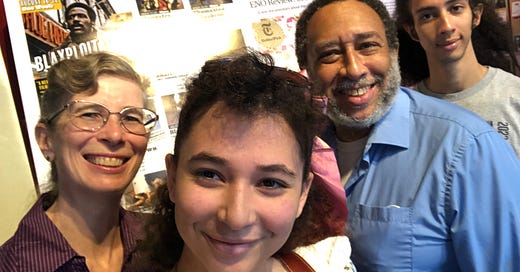Supporting Women's Rights... and Women's Wrongs (Am I Writing Romance Incorrectly?)
A Literal Literary Loser Explores Gender Politics
A Goodreads review of my November 2022 novel, “My Mother’s Secret: A Novel of the Jewish Autonomous Region,” called me out for focusing too much on my female characters’ flaws. It’s what prompted my teen daughter to quip the above title about supporting women’s rights… and women’s wrongs.
Recently, my oldest son observed that the male characters in my books tend to be idealized in a way that the women aren’t. He’s not wrong. And there are a couple of reasons for this.
First and foremost is that all my books, including the upcoming “Go On Pretending” are written from the point of view of the female characters. We are inside their heads in a way we never get to peek into the male characters’. And it’s messy in there. Because I try to make it real in there.
Real people aren’t perfect. The get cranky and jealous and petty and downright unpleasant. When you live inside somebody’s psyche, you’re going to get a fair share of that.
I never go inside my male characters’ heads. We only seem them through the heroines’ points of view. Which, as I explained here, raises an entirely different problem when the male character is also African-American. You’re not supposed to do that, I am told. I explained why I did it anyway in a post entitled, My Husband, the Coat Rack.
“Go On Pretending,” like the preceding “My Mother’s Secret: A Novel of the Jewish Autonomous Region” and “The Nesting Dolls,” is historical fiction. But all three books have a strong romantic element. (My background is in soap operas. I don’t know how to write anything without a strong romantic element.)
When it comes to romance, I want my readers to see what the heroine sees in the hero. Which means looking at him through her eyes. Which means making him less flawed than the person doing the looking.
I’ve never been an Alpha Male/Bad Boy type of girl. I prefer Beta males who only live to make the heroine happy and support her every endeavor and whim. I married one of those. Hence, My Husband, the Coat Rack. My idea of romance isn’t the guy who broods and scowls and is oh, so tragically misunderstood. (Ask me what I thought of Heathcliff in “Wuthering Heights.” Or, rather, don’t. You don’t have that kind of time.) My idea of romance is the guy who cleans up after the kid throws up. (I wrote a whole post about that, as well.)
So when I write male protagonists, I write the kind of men whom I’d fall in love with, in the hope of making my readers understand why my heroine did.
This has the side effect of making the men seem exemplary, and the women flawed.
A book I read 30 years ago, “Dangerous Men and Adventurous Women,” posited that readers of romance want female leads who are blank slates, ciphers they can then impose their own personalities on so that they can pretend that they are the ones being wooed by the bad boy, whom they then bring to heel and force to admit that they can’t live without the heroine.
That’s… not me. I don’t like books with a nonentity of a perfect heroine. If she wants me to care about her, she better be worth caring about! And that includes doing something at least vaguely intriguing. Even if it isn’t perfect.
I also don’t want to “break” a man. I don’t even want to “make” one, as I’m told women have to do. I want a man to come to me already pretty great the way he is. I’m too lazy to put in the work of making improvements. And if I don’t think he’s already pretty great, why would I want to waste my time in the hope of “changing” him?
That attitude kind of comes through in my writing. My women are flawed. My men are idealized. Romance is supposed to be fantasy, right? That’s my fantasy….
How about you?
****
On the other hand, I totally understand what it means to read a book where the heroine makes you want to reach into the story and slap her. I really enjoyed “The Matrimonial Flirtations of Emma Kaulfield,” but, my goodness, I have never wanted a heroine to fail more than I did this one. I explain to my daughter why that was, as we also discuss what do children owe their immigrant parents, and should you “stick with your kind” when dating? Watch now at:



Thought-provoking post! I don't read romance, although my wife does, but I think idealised heroes/heroines are more common and accepted in some genres than others. I also think statements like, "Women want a man like X" or "Men want a woman like Y" can speak of a majority at best, probably not even that. There are always going to be lots of exceptions, particularly when you talk about fantasy rather than reality. I certainly have fantasies (not just romantic/sexual) that I don't want to actually come true in reality and I'm sure I'm not the only one.
(I also dislike the whole alpha/beta male thing, but that's another story.)
I'm with you part way. My female characters are messes. No blank slates for me. But my guys are messes, too. That's just life. I want my readers to believe their mess can find a compatible mess, and the two can become less messy together. Really enjoyed your post. Thanks for making me think about this!